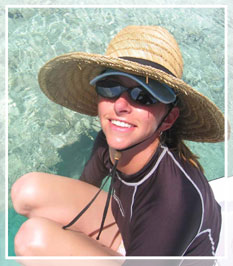Leal Mertes was a Geography faculty member who investigated rivers, wetlands and floodplains globally. Her interests spanned the dynamics of river channel, floodplain and wetlands interactions; the remote sensing of wetland environments; and the long term evolution of large river systems. She also devoted a great deal of effort to educational issues, including curriculum design and assessment. The Memorial Scholarship Fund was established to honor Leal by supporting UCSB students (graduate or undergraduate) who are planning or are engaged in field research. The Leal Mertes Memorial Scholarship is awarded to talented and deserving UCSB students enrolled in any UCSB department where fieldwork in natural science is conducted. For the purposes of this scholarship, “field work” is defined as any off-campus activity devoted to studying, observing, sampling, investigating or measuring natural or human phenomena. The fund supports both the scholarships and the expenses associated with the awarding of these scholarships.
Geography graduate student Laurel Suter (left) shares this year’s Leal Mertes Memorial Scholarship Fund with Elizabeth Madin (below), a grad student in the Department of Ecology, Evolution and Marine Biology. Laurel’s proposed research project is titled “Land Use/Land Cover Change in the Evolving Agricultural Frontier.” Using Guatemala’s northernmost department of Petén as a research site, Laurel’s research objectives include investigating the determinants of farmer land use decisions as the agricultural frontier advances into closed forest. She will use her Mertes Memorial Fellowship to fund her first visit to Guatemala, where she will meet with collaborators and centralized administrators in Guatemala City, and from there travel up to Flores, Petén as an outpost for reconnaissance of field sites. She is extremely grateful to receive this award and will make a one month visit early in the New Year. Elizabeth Madin’s project is titled “Behavioral changes associated with predator removal and their impacts on coral reef community structure.” She states: “My study seeks to answer the novel and critically important questions: Over a gradient of human influence, do the various components of the reef behave differently? If so, what are the community-wide consequences of these changes? Using the Line Islands of the Pacific as a study system, I aim to conduct community censuses and behavioral surveys of coral reef fishes in order to understand if and how fishing of top predators (i.e., large carnivorous fishes) causes fear-induced behavioral changes in herbivorous fishes, and, if so, how these changes affect the overall structure of the reef community…With this information, we can better predict how removal of specific components of the reef community may affect overall reef structure, a key step in determining how to best ensure the persistence of coral reefs worldwide.”



